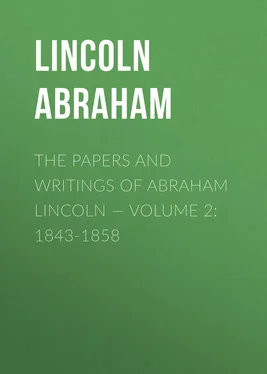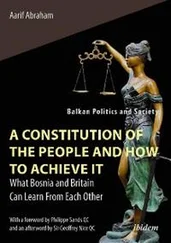Abraham Lincoln - The Papers And Writings Of Abraham Lincoln — Volume 2 - 1843-1858
Здесь есть возможность читать онлайн «Abraham Lincoln - The Papers And Writings Of Abraham Lincoln — Volume 2 - 1843-1858» — ознакомительный отрывок электронной книги совершенно бесплатно, а после прочтения отрывка купить полную версию. В некоторых случаях можно слушать аудио, скачать через торрент в формате fb2 и присутствует краткое содержание. Жанр: foreign_antique, foreign_prose, на английском языке. Описание произведения, (предисловие) а так же отзывы посетителей доступны на портале библиотеки ЛибКат.
- Название:The Papers And Writings Of Abraham Lincoln — Volume 2: 1843-1858
- Автор:
- Жанр:
- Год:неизвестен
- ISBN:нет данных
- Рейтинг книги:3 / 5. Голосов: 1
-
Избранное:Добавить в избранное
- Отзывы:
-
Ваша оценка:
- 60
- 1
- 2
- 3
- 4
- 5
The Papers And Writings Of Abraham Lincoln — Volume 2: 1843-1858: краткое содержание, описание и аннотация
Предлагаем к чтению аннотацию, описание, краткое содержание или предисловие (зависит от того, что написал сам автор книги «The Papers And Writings Of Abraham Lincoln — Volume 2: 1843-1858»). Если вы не нашли необходимую информацию о книге — напишите в комментариях, мы постараемся отыскать её.
The Papers And Writings Of Abraham Lincoln — Volume 2: 1843-1858 — читать онлайн ознакомительный отрывок
Ниже представлен текст книги, разбитый по страницам. Система сохранения места последней прочитанной страницы, позволяет с удобством читать онлайн бесплатно книгу «The Papers And Writings Of Abraham Lincoln — Volume 2: 1843-1858», без необходимости каждый раз заново искать на чём Вы остановились. Поставьте закладку, и сможете в любой момент перейти на страницу, на которой закончили чтение.
Интервал:
Закладка:
Mr. Chairman, on the third position of the message the constitutional question — I have not much to say. Being the man I am, and speaking, where I do, I feel that in any attempt at an original constitutional argument I should not be and ought not to be listened to patiently. The ablest and the best of men have gone over the whole ground long ago. I shall attempt but little more than a brief notice of what some of them have said. In relation to Mr. Jefferson's views, I read from Mr. Polk's veto message:
"President Jefferson, in his message to Congress in 1806, recommended an amendment of the Constitution, with a view to apply an anticipated surplus in the treasury 'to the great purposes of the public education, roads, rivers, canals, and such other objects of public improvement as it may be thought proper to add to the constitutional enumeration of the federal powers'; and he adds: 'I suppose an amendment to the Constitution, by consent of the States, necessary, because the objects now recommended are not among those enumerated in the Constitution, and to which it permits the public moneys to be applied.' In 1825, he repeated in his published letters the opinion that no such power has been conferred upon Congress."
I introduce this not to controvert just now the constitutional opinion, but to show that, on the question of expediency, Mr. Jefferson's opinion was against the present President; that this opinion of Mr. Jefferson, in one branch at least, is in the hands of Mr. Polk like McFingal's gun — "bears wide and kicks the owner over."
But to the constitutional question. In 1826 Chancellor Kent first published his Commentaries on American law. He devoted a portion of one of the lectures to the question of the authority of Congress to appropriate public moneys for internal improvements. He mentions that the subject had never been brought under judicial consideration, and proceeds to give a brief summary of the discussion it had undergone between the legislative and executive branches of the government. He shows that the legislative branch had usually been for, and the executive against, the power, till the period of Mr. J.Q. Adams's administration, at which point he considers the executive influence as withdrawn from opposition, and added to the support of the power. In 1844 the chancellor published a new edition of his Commentaries, in which he adds some notes of what had transpired on the question since 1826. I have not time to read the original text on the notes; but the whole may be found on page 267, and the two or three following pages, of the first volume of the edition of 1844. As to what Chancellor Kent seems to consider the sum of the whole, I read from one of the notes:
"Mr. Justice Story, in his Commentaries on the Constitution of the United States, Vol. II., pp. 429-440, and again pp. 519-538, has stated at large the arguments for and against the proposition that Congress have a constitutional authority to lay taxes and to apply the power to regulate commerce as a means directly to encourage and protect domestic manufactures; and without giving any opinion of his own on the contested doctrine, he has left the reader to draw his own conclusions. I should think, however, from the arguments as stated, that every mind which has taken no part in the discussion, and felt no prejudice or territorial bias on either side of the question, would deem the arguments in favor of the Congressional power vastly superior."
It will be seen that in this extract the power to make improvements is not directly mentioned; but by examining the context, both of Kent and Story, it will be seen that the power mentioned in the extract and the power to make improvements are regarded as identical. It is not to be denied that many great and good men have been against the power; but it is insisted that quite as many, as great and as good, have been for it; and it is shown that, on a full survey of the whole, Chancellor Kent was of opinion that the arguments of the latter were vastly superior. This is but the opinion of a man; but who was that man? He was one of the ablest and most learned lawyers of his age, or of any age. It is no disparagement to Mr. Polk, nor indeed to any one who devotes much time to politics, to be placed far behind Chancellor Kent as a lawyer. His attitude was most favorable to correct conclusions. He wrote coolly, and in retirement. He was struggling to rear a durable monument of fame; and he well knew that truth and thoroughly sound reasoning were the only sure foundations. Can the party opinion of a party President on a law question, as this purely is, be at all compared or set in opposition to that of such a man, in such an attitude, as Chancellor Kent? This constitutional question will probably never be better settled than it is, until it shall pass under judicial consideration; but I do think no man who is clear on the questions of expediency need feel his conscience much pricked upon this.
Mr. Chairman, the President seems to think that enough may be done, in the way of improvements, by means of tonnage duties under State authority, with the consent of the General Government. Now I suppose this matter of tonnage duties is well enough in its own sphere. I suppose it may be efficient, and perhaps sufficient, to make slight improvements and repairs in harbors already in use and not much out of repair. But if I have any correct general idea of it, it must be wholly inefficient for any general beneficent purposes of improvement. I know very little, or rather nothing at all, of the practical matter of levying and collecting tonnage duties; but I suppose one of its principles must be to lay a duty for the improvement of any particular harbor upon the tonnage coming into that harbor; to do otherwise — to collect money in one harbor, to be expended on improvements in another — would be an extremely aggravated form of that inequality which the President so much deprecates. If I be right in this, how could we make any entirely new improvement by means of tonnage duties? How make a road, a canal, or clear a greatly obstructed river? The idea that we could involves the same absurdity as the Irish bull about the new boots. "I shall niver git 'em on," says Patrick, "till I wear 'em a day or two, and stretch 'em a little." We shall never make a canal by tonnage duties until it shall already have been made awhile, so the tonnage can get into it.
Конец ознакомительного фрагмента.
Текст предоставлен ООО «ЛитРес».
Прочитайте эту книгу целиком, купив полную легальную версию на ЛитРес.
Безопасно оплатить книгу можно банковской картой Visa, MasterCard, Maestro, со счета мобильного телефона, с платежного терминала, в салоне МТС или Связной, через PayPal, WebMoney, Яндекс.Деньги, QIWI Кошелек, бонусными картами или другим удобным Вам способом.
Интервал:
Закладка:
Похожие книги на «The Papers And Writings Of Abraham Lincoln — Volume 2: 1843-1858»
Представляем Вашему вниманию похожие книги на «The Papers And Writings Of Abraham Lincoln — Volume 2: 1843-1858» списком для выбора. Мы отобрали схожую по названию и смыслу литературу в надежде предоставить читателям больше вариантов отыскать новые, интересные, ещё непрочитанные произведения.
Обсуждение, отзывы о книге «The Papers And Writings Of Abraham Lincoln — Volume 2: 1843-1858» и просто собственные мнения читателей. Оставьте ваши комментарии, напишите, что Вы думаете о произведении, его смысле или главных героях. Укажите что конкретно понравилось, а что нет, и почему Вы так считаете.












